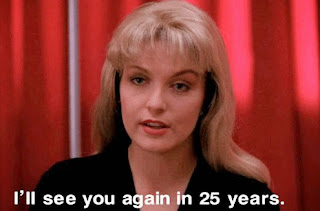Laura's prediction, in Agent Cooper's dream at the end of the first season's third episode, was just one of the many cryptic clues dropped during the show's brief, yet groundbreaking run.
When Lynch and Frost announced last month that "Twin Peaks" would return in 2016 for nine new episodes to air on Showtime, the news lit up the Internet like nothing short of announcing a new pope or a new "Star Wars" trilogy. As the giant told Agent Cooper, "It is happening again."
"Twin Peaks" returns to a television landscape radically changed from the one it shook up back in 1990 and '91. Back then, "Twin Peaks" was unique. Now, quirky shows with oddball characters and serialized storytelling that once was reserved for soap operas are virtually the norm.
"Twin Peaks" is in large part responsible for that.
When Lynch brought "Twin Peaks" to ABC in 1990, it was almost unheard of for respected filmmakers to slum in the television ghetto. Now that's common, too, and no one but the most obnoxious art-film snobs looks down on TV.
Yet that's not all that's changed about television in the intervening quarter century.
"Twin Peaks" is many things. It mixes comedy, melodrama, horror, science fiction, urban legends, bleeding-edge physics and Buddhist philosophy into the most compelling murder mystery since Jack the Ripper. "Who killed Laura Palmer" was the second coming of "Who shot J.R.?"
Yet structurally, "Twin Peaks" is deceptively simple. It's a parody of soap operas, and not the nighttime variety such as "Dallas" and "Dynasty," which reigned over the 1980s, but the daytime kind.
Like virtually every daytime soap ever aired, "Twin Peaks" is set in a fictional town with a sordid underbelly. A logging/resort community near the Canadian border, Twin Peaks falls into the long tradition of made-up burghs, from Salem to Genoa City, that attract more than their share of drama.
The show's mood music, courtesy of composer Angelo Badalamenti, swells with overwrought intensity at every romantic interlude. And the multi-generational cast reflects the storytelling necessities of daytime soaps, which traditionally shift their plots toward younger cast members in the summer to take advantage of teens being out of school.
 |
| "It is happening again. It is happening again." |
Infidelity? Aplenty. Convenient cases of amnesia? Nadine coming out of a coma thinking she's a teenager and back in high school qualifies. Characters presumed dead who turn out to have faked their deaths? That runs in the Packard family. A shady businessman who owns most of the town and schemes to gobble up or destroy everything he doesn't? Well, of course. "Twin Peaks" even has that most soapy of soap opera tropes, the identical twin who appears out of the blue.
James, a lovesick teen with resting pout face, seems to have just arrived from daytime TV. He goes through soul mates faster than most men do TV channels. He starts as Laura's "secret boyfriend" and moves on to her best friend Donna before the corpse is cold. Next he's on to Laura's identical cousin, then back to Donna and finally into the arms of an older woman, who so obviously plans to Double Indemnity him that we realize it faster than James can say Barbara Stanwyck.
In case all that doesn't clue us in, almost everyone in Twin Peaks is hooked on a soap opera within the soap opera, the amusingly overwrought "Invitation to Love": a parody within a parody.
But can "Twin Peaks" return as the same soap parody it was? In 1990 ABC, CBS and NBC each aired between three and four hours of soap opera programming each weekday. Today they air 3½ hours total between them. The daytime soap is a dead format, wrapped in plastic.
How the soap opera's demise will play into what Lynch and Frost have planned is, for now, just another of their unsolved mysteries. It could even involve a long lost twin.
 |
| "Would you like to play with fire? Would you like to play with Bob?" |

No comments:
Post a Comment